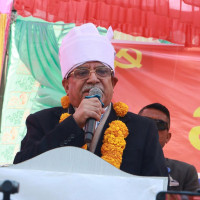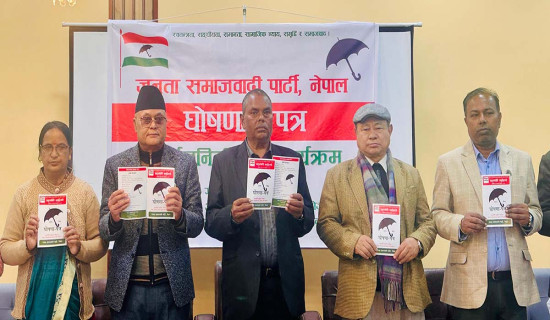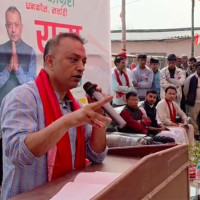- Saturday, 14 February 2026
Civic Action Keeps 'Kleptocracy' In Check
One of the good things the Gen Z movement has done for the nation has been that it has laid bare the real face of some of the leaders who were often accused of siphoning off resources from the national coffer. But the allegations in the past were based on hearsay or unsubstantiated rumours and not backed up with any concrete evidence. In the movement, Gen Z activists ransacked and torched the residences of senior leaders and ministers, like Sher Bahadur Deuba, KP Sharma Oli, Pushpa Kamal Dahal Prachanda, Dr. Babu Ram Bhattarai, Deepak Khadka, and so on. They reportedly found the illicit wealth ensconced in the clandestine vault kept at the houses of some of the senior leaders.
The hidden ill-gotten wealth was unearthed and shown to the public at large through audio-visual means, including TV footage. The stacks of concealed currencies, reportedly US dollars among others, were set on fire and gutted. However, it would have been appropriate had the activists seized and preserved the wealth to produce as evidence for further probing and investigation to indict the leaders concerned. Moreover, resources thus uncovered and collected could be redirected for constructive and developmental purposes. Anyway, the political leaders who flaunted verbally their honesty and integrity, time and again, have been badly exposed and got their reputation severely mauled at the peril of their public and political career.
Ill-gotten wealth
It shows that kleptocracy is well entrenched in Nepal, too. The word "Kleptocracy" is generally meant to signify the ill-gotten wealth kept or stashed away in foreign banks or invested in shady deals overseas. But there was no concrete and tangible evidence to support or indict them. From the time of monarchy to republican-era rulers, political leaders are accused of having looted and siphoned off the illicit wealth to foreign banks. But there are no bases to back up these accusations. Kleptocracy has been widely discussed in the reports published by Transparency International (TI) and many other organisations working around justice, freedom and transparency and accountability.
The widely valued and circulated publication brought out by the US National Endowment for Democracy (NED), named Journal of Democracy, has recently included a well-researched article titled “The Rise of Kleptocracy: A challenge for Democracy”, contributed by Christopher Walker and Melissa Alen, which makes an interesting reading on the subject. The term kleptocracy has come into greater usage, especially following the rise of offshore finance, enabling corruption to metastasize into a far more complex and vexing international problem. Today's kleptocrats launder their money overseas, storing it in settings where it is protected. This looted money, according to Walker and Allen, was channelled through a complex web of offshore accounts and shell companies to obscure the beneficial owners.
Globalised kleptocrats have been able to embed themselves not only in the international financial system but also in the fabric of democratic societies, developing "sophisticated global networks to launder their wealth and avoid international scrutiny. Kleptocrats launder not just their wealth but also their reputations. In an interconnected world of omnipresent and investigative media, it is difficult to hide and conceal. The kleptocrats, therefore, must operate more or less in the open, feigning transparency in their operations or transactions. Yet they have devised ways to camouflage and shield their avaricious activities. Their toolkit includes securing multiple citizenships, hiring public relations experts, and undertaking philanthropic activities that serve to launder money through transnational networks.
The massive corruption evident in these cases is certainly about greed, but sometimes it also has a geostrategic dimension. Dictatorial regimes use corruption internationally to undermine democratic resolve and principles in established democracies. This is possible because "kleptocracy puts enormous resources at the government’s disposal to co-opt foreign business and political elites. Russian scholar Mark Galeotti, as quoted in the article, calls this phenomenon the "mobilisation state". Its essence is that "nothing is beyond regime’s reach; that anybody, any institution, from companies to criminal gangs, can be called on to carry out intended missions, this is, in effect, the weaponization of kleptocracy. Dictatorial regimes lavish expensive gifts and extensive bribes on the powerful officials to polish their reputation.
Accountability
Corruption poses a persistent challenge in most societies. But its scope and impact can be kept in check through a country's internal accountability and transparency mechanisms, including independent media, civil society, impartial courts, legislative oversight, political opposition and civic action. Oftentimes, it is found that Kleptocracy uses public institutions to enable a network of ruling elites to steal public funds for their own private gain. In such settings, internal checks on power are neutralised or co-opted. The state is captured by narrow interests that use the global financial system to launder and protect their ill-gotten gains. This international dimension of modern kleptocracy creates complex problems that require new and more sophisticated responses.
Kleptocracy represents an exceedingly dangerous threat to democracy. Well-resourced kleptocracies project their sophisticated corrupt practices beyond national borders with an ever-increasing impact felt in new and established democracies alike. Given the ease with which illicit money can flow around the world in the era of globalisation, some have called this the golden age of money laundering. Against this backdrop, the Gen Z movement has demonstrated that civic action can be a potent tool to uncover the concealed wealth in the residences of the political leaders. It is yet to be known if such ill-gotten wealth is stashed away in foreign destinations. However, it can be said that civic action is an effective deterrent to such financial offences, as it brings shame and discredit to the political career and social reputation of leaders. But such action should be taken with all restraints.
(The author is presently associated with Policy Research Institute (PRI) as a senior research fellow. rijalmukti@gmail.com)








-square-thumb.jpg)






